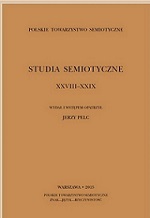Efekt Hermesa. Studium analityczne z semiotyki teoretycznej
The Hermes Effect. An Analytical Study in Theoretical Semiotics
Author(s): Michał R. WęsierskiSubject(s): Semiotics / Semiology, Philosophy of Language
Published by: Polskie Towarzystwo Semiotyczne
Keywords: prognosticating; notions of prognosis; communication process; communication strategies; text; message; encoding; decoding; interpretation
Summary/Abstract: Artykuł ten stanowi próbę ukazania podstawowych relacji pomiędzy treścią wygłoszonego przez komunikatu a kolejnymi odbiorcami tego komunikatu. Artykuł przestawia semiotyczne własności zespołu operacji oraz proces interpretacji i recepcji produktów finalnych tych operacji, a także własności niezbędne dla efektywności aktu komunikacji występującego między nadawcą a rzeczywistymi i potencjalnymi odbiorcami prognoz. Celem niniejszego artykułu jest wstępna semiotyczna specyfikacja semantyczno-pragmatycznego zjawiska nazywanego przez autora „efektem Hermesa”. Artykuł przedstawia relację między nadawcą prognozy a prognozą w jej trzech znaczeniach: jako tekst (książka, artykuł itd.), konkretny sposób rozumowania (inferencja, tj. argumentacja prognostyczna) oraz wniosek rozumowania, a także relacją między prognozą i jej odbiorcami. Wspomniany efekt Hermesa dotyczy relacji między sposobami przekazywania treści prognoz (w trzech znaczeniach) oraz reakcją odbiorców, a także tym, co dzieje się z prognozą kiedy wychodzi poza kontrolę. ===== This paper is an attempt to show the basic relations between the content of the given announcement by the prognosticator and its subsequent receivers. The article presents semiotic qualities of the cognitive operations, and the process of receiving and interpreting the final results of such operations, as well as the qualities crucial to the effectiveness of the communicative act between the sender and the actual and potential receivers of the prognosis. The aim of the paper is to explore the semiotic specification of semantic-pragmatic phenomenon called by the author the “Hermes effect”. The article presents the relation between the sender of the prognosis and the primary prognosis in its three meanings: as a text (book, article etc.), the specific type of reasoning (inference, i.e. prognostic argumentation) and the conclusion of the reasoning, as well as the relation between the prognosis and its subsequent receivers. The aforementioned Hermes effect concerns the relation between the way of transferring the content of the prognoses (understood threefold) and the reaction of the addressees, and what happens with the prognosis when it is beyond the first degree sender’s control.
Journal: Studia Semiotyczne
- Issue Year: XXIX/2015
- Issue No: 1
- Page Range: 229-251
- Page Count: 23
- Language: Polish

